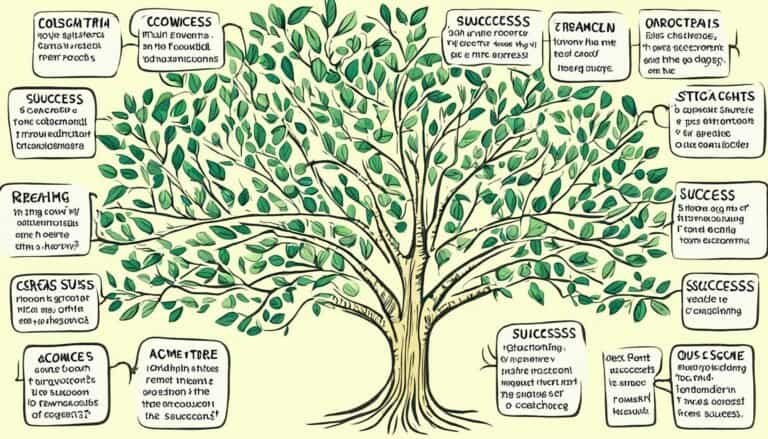Can Coaching Help With Grief?
Did you know that coaching can play a significant role in helping individuals cope with grief? While it may not be a commonly known fact, coaching has emerged as a powerful tool in navigating the complex emotions and challenges that arise from loss and bereavement.
The question of whether coaching can truly help with grief is one that deserves exploration and understanding. How exactly can coaching support individuals in their grieving process? What techniques and approaches are used by coaches to provide grief support?
Through personal stories and experiences, we can shed light on the transformative potential of coaching in building resilience and healing. So, if you're seeking guidance and support in your journey of grief, this discussion will offer valuable insights into the role of coaching in overcoming challenges and finding solace.
Key Takeaways
- Coaching provides empathetic support and guidance in navigating grief.
- Goal setting helps individuals develop effective coping strategies.
- Coaching transforms grief into growth and offers personalized support.
- Different coaching techniques offer personalized support for coping with grief.
Understanding the Role of Coaching in Grief
Coaching plays a crucial role in navigating the complexities of grief, providing empathetic support and guidance to help you through the healing process. When you're grieving, it's normal to feel overwhelmed, confused, and lost. This is where coaching techniques can be incredibly beneficial. A grief coach is trained to understand the unique challenges that come with grief and can help you develop effective coping strategies.
One of the key coaching techniques used in grief coaching is active listening. Your coach will listen attentively to your thoughts, feelings, and concerns without judgment. This creates a safe space for you to express your emotions and share your experiences. Through active listening, your coach can identify patterns, themes, and triggers that may be impacting your grief journey.
Another coaching technique that can greatly assist with grief coping is goal setting. Together with your coach, you'll identify specific goals and milestones that you'd like to achieve during your healing process. These goals can be related to emotional healing, self-care, or even rebuilding your life after loss. Your coach will provide guidance and support as you work towards these goals, helping you stay focused and motivated.
Coaching in grief is a collaborative process. Your coach will empower you to make decisions and take control of your own healing. They'll provide you with tools and resources to navigate the challenges of grief, but ultimately, the power to heal lies within you. Your coach will be there every step of the way, offering support, encouragement, and understanding as you navigate through your grief journey.
Benefits of Coaching in the Grieving Process
During the grieving process, coaching provides valuable support and guidance, helping you navigate the complexities of grief and find healing. Understanding grief coaching can be transformative, as it offers a unique and personalized approach to your journey of healing.
One of the key benefits of coaching in the grieving process is that it provides a safe and non-judgmental space for you to express and explore your emotions. Grief can be overwhelming and confusing, and having a coach by your side can help you make sense of your feelings and experiences. They can offer a listening ear and validate your emotions, providing the understanding and support you need.
Coaching can also help you gain a deeper understanding of your grief and its impact on various aspects of your life. By working with a coach, you can uncover patterns and beliefs that may be hindering your healing process. They can help you identify and challenge any negative thoughts or behaviors, empowering you to transform your grief into growth.
Furthermore, coaching can assist you in setting goals and creating a roadmap for your healing journey. Your coach can help you identify what you need and want during this time and guide you in taking small, manageable steps towards healing and rebuilding your life. They can provide accountability and encouragement as you progress towards your goals, ensuring that you stay on track and continue moving forward.
Different Coaching Techniques for Grief Support
As you navigate the complexities of grief and seek healing, it can be helpful to explore different coaching techniques that offer personalized support and guidance for your grief journey. Here are three coaching techniques that can assist you in coping with your grief:
- Mindfulness-based coaching: This technique focuses on cultivating present-moment awareness and acceptance of your grief experience. By practicing mindfulness, you can learn to observe your thoughts and emotions without judgment, allowing you to develop a deeper understanding of your grief and find inner peace.
- Cognitive-behavioral coaching: This approach helps you identify and challenge negative thought patterns and beliefs that may be contributing to your grief. Through cognitive restructuring and behavioral interventions, you can develop healthier coping strategies and change unhelpful behaviors that are prolonging your grief.
- Solution-focused coaching: This technique emphasizes identifying and building upon your strengths and resources to create positive change in your life. By setting achievable goals and focusing on solutions rather than dwelling on problems, you can gain a sense of empowerment and move forward in your grief journey.
Personal Stories: Finding Solace Through Coaching
Finding solace through coaching can provide a valuable space for you to share your personal stories of grief and find support on your healing journey. Each individual's experience with grief is unique and deeply personal, but through coaching, you can find comfort in knowing that you are not alone.
Imagine sitting down with a compassionate coach who truly listens to your story, allowing you to express your emotions freely without judgment. This empathetic support can be transformative, helping you navigate the complex emotions that come with grief and facilitating personal growth.
To illustrate the power of personal stories in coaching, let's take a moment to reflect on the following table:
| Story | Emotion | Outcome |
|---|---|---|
| Sarah's Story | Overwhelming sadness and guilt | Rediscovered self-compassion and forgiveness, found new purpose |
| John's Story | Anger and confusion | Developed coping strategies, gained clarity and perspective |
| Emily's Story | Loneliness and isolation | Built a strong support network, experienced connection and belonging |
| Michael's Story | Fear and anxiety | Cultivated resilience, learned to manage anxiety, and found inner peace |
| Lily's Story | Numbness and emptiness | Reconnected with emotions, rediscovered joy, and embraced life fully |
Reading these stories can evoke a range of emotions, highlighting the power of personal narratives in providing comfort and understanding. Your own story, too, can find solace through coaching as you embark on your healing journey. Remember, healing takes time, but with the right support, you can find personal growth and navigate the challenges of grief with resilience and strength.
Building Resilience and Healing With Coaching
You've been through a lot, and building resilience is an important part of your healing journey.
Coaching can provide you with coping strategies to navigate the challenges of grief, helping you find emotional support and guidance along the way.
Together, we can work towards transforming your pain into growth and discovering a path towards healing and resilience.
Coping Strategies for Grief
When experiencing grief, it can be beneficial to explore coping strategies that focus on building resilience and healing through coaching. Here are three strategies that can help you navigate through your grief journey with support and understanding:
- Cognitive Therapy: Working with a coach who specializes in cognitive therapy can help you identify and challenge negative thought patterns that may be prolonging your grief. By reframing your thoughts and beliefs, you can develop a more positive and balanced perspective on your loss.
- Mindfulness Techniques: Practicing mindfulness can help you cultivate self-compassion and acceptance during times of grief. A coach can guide you in incorporating mindfulness techniques such as meditation, deep breathing, and grounding exercises to help you stay present and manage overwhelming emotions.
- Building a Support System: A coach can assist you in building a strong support system that includes friends, family, and other individuals who can provide comfort and understanding. Having a network of people who can offer emotional support can be crucial in the healing process.
Emotional Support Through Coaching
As you continue your grief journey, it's important to recognize the value of emotional support through coaching, as it can help you build resilience and find healing in the midst of your pain.
Emotional healing is a complex process, and navigating it alone can be overwhelming. That's where coaching comes in. A grief coach can provide you with a safe space to express your emotions, validate your experiences, and help you develop coping strategies for grief recovery.
Through active listening and empathetic guidance, a coach can support you in exploring your emotions, identifying healthy ways to cope, and ultimately finding healing. They can help you develop resilience by encouraging self-care practices, fostering self-compassion, and assisting you in creating a personalized plan for moving forward.
Transforming Pain Into Growth
Coaching can be a transformative tool in helping you build resilience, find healing, and transform your pain into growth. When you're grieving, it's natural to feel overwhelmed and stuck in your pain. However, with the right guidance and support, coaching can empower you to navigate through your grief and emerge stronger on the other side.
Here are three ways coaching can help you transform your pain into personal growth:
- Exploring your emotions: Coaching provides a safe space for you to fully acknowledge and express your emotions. By delving deep into your feelings, you can gain clarity and understanding, paving the way for healing and growth.
- Creating a new narrative: Through coaching, you can reframe your experience of loss and reshape your narrative. By focusing on the lessons learned and the strength gained, you can find meaning in your pain and use it as a catalyst for personal growth.
- Setting goals and taking action: Coaching helps you identify your aspirations and set meaningful goals for your future. By taking small, actionable steps towards these goals, you can channel your pain into personal growth and create a life that's aligned with your values and purpose.
Overcoming Challenges in Grief With Coaching
You may be facing numerous challenges in your grief journey, and it can feel overwhelming at times.
However, coaching can provide you with effective techniques to navigate these challenges and find healing.
Through personalized support and guidance, grief coaching can help you develop resilience, cope with difficult emotions, and move forward in your healing process.
Coaching Techniques for Grief
When navigating the challenges of grief, one effective approach is utilizing coaching techniques to help overcome the emotional hurdles. Grief coaching techniques can provide you with the guidance and support you need to navigate the complex journey of grief. Here are three coaching techniques that can be particularly beneficial:
- Emotional support: A grief coach can provide a safe space for you to express your emotions without judgment. They can offer empathetic listening, validation, and compassion, helping you process your feelings and find healing.
- Goal-setting: Grief coaching can help you set meaningful goals and create a roadmap for your grief journey. By identifying what you want to achieve and taking small, actionable steps, you can regain a sense of control and purpose amidst the pain.
- Self-care strategies: Grief can take a toll on your physical, emotional, and mental well-being. A grief coach can help you develop self-care strategies tailored to your needs, such as relaxation techniques, exercise routines, or mindfulness practices. Taking care of yourself is crucial in the healing process.
Benefits of Grief Coaching
Navigating the challenges of grief can be overwhelming, but with the support of grief coaching, you can find the strength and tools to overcome them. Grief coaching techniques offer valuable benefits that can help you in your journey towards finding healing.
One of the key benefits is the guidance and support provided by a grief coach. They have the expertise to help you navigate the complexities of grief and provide a safe space for you to express your emotions.
Through personalized strategies and tools, grief coaching can help you develop coping mechanisms and resilience. Additionally, grief coaching can assist you in setting goals and creating a roadmap for your healing process.
With the compassionate guidance of a grief coach, you can find solace, understanding, and the resources you need to navigate the challenges of grief and ultimately find healing.
Seeking Support and Guidance: The Role of Coaching in Grief
Seeking support and guidance during the grieving process can be incredibly beneficial, as coaching offers a compassionate and empowering approach to navigating the complexities of loss. As you embark on your grief journey, it's important to have someone by your side who understands the depths of your pain and can provide the necessary tools and support to help you heal.
Here are three ways in which coaching can assist you in finding hope and healing:
- Emotional Support: Grief coaching provides a safe space for you to express your emotions and share your story without judgment. A coach can listen with empathy and understanding, offering a compassionate presence that allows you to process your grief at your own pace.
- Practical Strategies: Grief coaching equips you with practical strategies and coping mechanisms to navigate the challenges that arise during the grieving process. Whether it's managing overwhelming emotions, setting boundaries with others, or finding healthy ways to honor your loved one's memory, a coach can guide you towards finding effective solutions.
- Empowerment and Growth: Through coaching, you can develop a sense of empowerment and agency in your grief journey. A coach can help you identify your strengths and values, encouraging personal growth and transformation. By setting realistic goals and taking small steps forward, you can find hope and healing amidst your grief.
Conclusion
In the journey of grief, coaching can be a guiding light, illuminating the path towards healing and resilience. Like a gentle breeze that carries away the weight of sorrow, coaching offers solace and support.
It's a lifeline, helping individuals navigate the choppy waters of loss. With the right techniques and compassionate guidance, coaching can empower those grieving to overcome challenges and find their way towards a brighter tomorrow.
Let coaching be your companion on this transformative journey of healing and growth.







